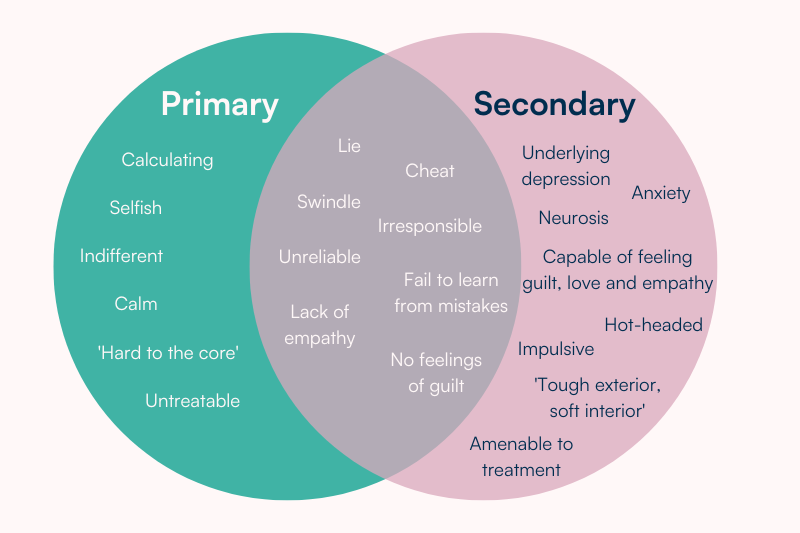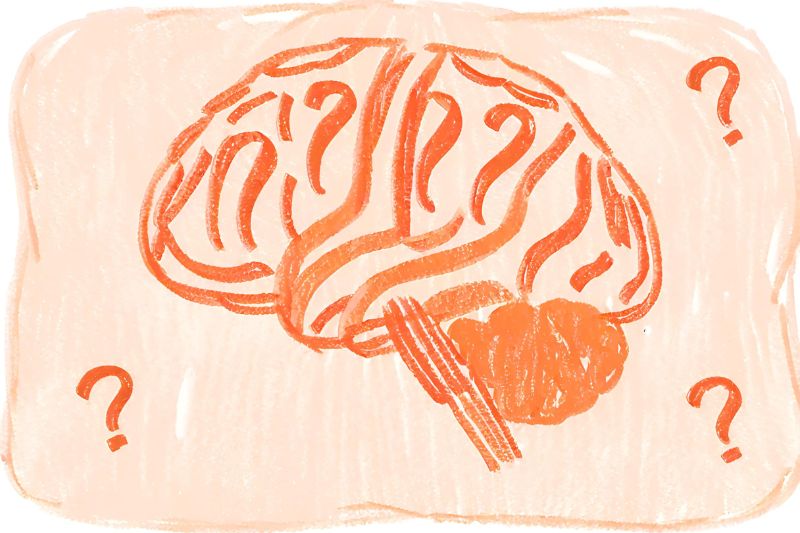Can a Psychopath Suffer from Health Anxiety?
Psychopaths are often thought of as emotionless and unaffected by anxiety. However, studies have found that the reality is more complex. Here, we'll examine whether psychopaths can experience health anxiety.

Many of us will have a clear idea in our heads of what a psychopath is like. We might, for example, think of someone who appears charming on the surface, but who frequently lies, can be casually cruel and callous, and even commits crimes simply on a whim. While this may be something of a caricature, some individuals with antisocial personality disorder do possess some of these commonly imagined traits.
For many years, psychologists have studied the reasons why psychopaths act as they do, with some theorising that low levels of anxiety could explain their impulsive behaviours. As such, you might wonder if it’s possible for a psychopath to suffer from health anxiety. In this article, we’ll take a look at the research to determine whether this is the case.
What is psychopathy?
Though the term ‘psychopath’ is well known amongst the general public, it is not a medical diagnosis in its own right. Instead, it is considered to be a severe form of antisocial personality disorder (ASPD), which also encompasses sociopathy. Neither psychopathy nor sociopathy are officially used terms today, though both remain in common parlance.
According to Mind, some of the symptoms experienced by people with ASPD are:
- behaving dangerously, aggressively, or in ways that hurt those around them
- acting impulsively and getting into risky situations
- lacking empathy
It isn’t clear what causes ASPD, but researchers believe that both genetic and environmental factors come into play. The Mayo Clinic's guide to ASPD notes that our personalities develop during childhood, and that events from this period—for example, being subjected to abuse or lacking stability in one’s family life—could trigger the disorder. Those with a family history of ASPD are more likely to develop the condition, and it’s more common amongst men than women.
Do psychopaths feel anxiety?
As well as the symptoms mentioned above, psychopaths are often thought of as individuals who do not experience anxiety. This view was perhaps best summed up by Hervey Cleckley in The Mask of Sanity, in which he wrote that a psychopath “appears almost as incapable of anxiety as of profound remorse”.
Weighing up the evidence, there is some support for this theory. Perhaps most notable is a 1957 study by David Lykken. This found that those classed as “'primary' sociopaths”—another term for those with ASPD—“showed significantly less 'anxiety' on a questionnaire device”. More recently, a 2021 review stated that there was “evidence for attenuated fear/anxiety levels in primary psychopathy”.
Two types of psychopathy
You may have noticed the word ‘primary’ being used by the above authors—and that’s no accident. One theory holds that there are two different types of psychopathy: primary and secondary. This was first explored by Ben Karpman in a 1941 article in the Journal of Criminal Psychopathology. In the Venn diagram below, you can see some of the shared and defining characteristics of these two subtypes.

As the diagram indicates, both primary and secondary psychopaths exhibit similar types of antisocial behaviour, including a lack of empathy and a propensity to lie and cheat. However, the mentality underpinning the two types of psychopathy is profoundly different.
Primary psychopaths exhibit the mindset that is commonly associated with ASPD by the general public: completely unfeeling, calculating and self-centred. Those with secondary psychopathy, meanwhile, actually experience significant levels of depression and anxiety, and are capable of feelings such as guilt and empathy, even if they do not display this in their behaviour.
Research by a team led by Arjun Sethi found that, while primary psychopaths do indeed have a “reduced neural response to fear”, this characteristic has not been observed in secondary psychopaths. Instead, they may experience high levels of anxiety and adopt psychopathic behaviour “in response to environmental adversity”.
Is there really a link between anxiety and psychopathy?
While some researchers have attempted to separate out psychopathy into subtypes that do and do not experience anxiety, others have cast doubt on whether there is any link between the two conditions in the first place.
In a study of incarcerated men using the Psychopathy Checklist (PCL-R), William Schmitt and Joseph Newman found that there was “no support for the traditional view that psychopathy and anxiety are inversely related”. Based on their results, they stated that either the checklist was a poor indicator of psychopathy, or “the traditional belief that all psychopathic individuals are low-anxious is incorrect”.
Later studies seem to back up Schmitt and Newman’s findings. A study by Visser, Ashton and Pozzebon, for example, found that “low anxiety is likely not a core feature of psychopathy”, with stress immunity being “nearly unrelated to other indicators” of the condition. Meanwhile, a study by Karen Derefinko found that while psychopathic individuals had lower levels of inhibition or constraint, anxiety and fear were only “negligibly related to psychopathy”.
Psychopathy and health anxiety

So far, we’ve discussed the ability of psychopaths to feel anxiety more generally. However, one aspect we haven’t touched upon is whether it’s possible for them to suffer from health anxiety.
To date, there appears to have been no research regarding the propensity of psychopaths to suffer from health anxiety. However, based on what we know about antisocial personality disorder, we can make some inferences.
While the links between ASPD and other health conditions may not be immediately clear, research by Beaver et al has found that psychopathic personality traits are “linked to a long list of negative life outcomes”. They found that:
- Antisocial behaviours and involvement in crime were “strongly tied to health-related outcomes” both physical and mental in nature
- Psychopathic personality traits were “linked to the use of drugs, alcohol, and tobacco”, which in turn increase one’s risk of developing a range of diseases
- Individuals with a lack of self-control, including psychopaths, are at a greater risk of conditions such as “high cholesterol, high blood pressure, reduced physical health, and even cancer”
Given the above, it may be tempting to jump to the conclusion that a psychopath could not possibly suffer from health anxiety. It’s easy to assume, after all, that if they were aware that their behaviour could lead to negative outcomes for their health, they would not engage in it.
However, with studies appearing to show that some psychopathic individuals do experience high levels of anxiety, it’s difficult to state conclusively that no one with ASPD suffers from health anxiety. Instead, it may simply be the case that their impulsive nature and lack of self-control overrules their worry.
Can psychopaths suffer from health anxiety? Conclusions
On the surface, it can seem difficult to reconcile psychopathy with health anxiety. The former sees individuals behave with reckless abandon, while the latter revolves around excessive worry regarding one’s health.
However, with a greater understanding of the mindset underpinning psychopathy, this sharp dividing line becomes more blurred. Early research may have suggested that low anxiety was a key symptom of ASPD, but more recent studies indicate that some psychopaths may actually experience high anxiety. Others still feel that there may be no link between the two.
If we accept that some people with ASPD do experience anxiety, and yet nonetheless behave in antisocial ways, then it becomes easier to imagine how it could be possible for a psychopath to suffer from health anxiety, with one’s impulsiveness overcoming one’s worry. With a lack of solid research on this topic to go off, it’s difficult to come to a firm conclusion that psychopaths definitely suffer from health anxiety. By the same token, however, it’s just as impossible to rule out this possibility—and it appears clear that the long-held view that psychopaths were unable to experience anxiety at all is far from the truth.
Want to check your own level of health anxiety? Take our HA-7 questionnaire.
Post Date:
Author: Andy Boardman
Explore More Articles
3 Mental Health Myths Your Therapist Is Sick of Hearing
It's great that more people are talking about mental health, but not everything you hear is necessarily true. Don't fall for these 3 mental health myths!
Feeling Worried? Challenge Anxious Thoughts with These Simple Questions
Stuck in a spiral of anxious thoughts? Use these 3 simple questions to challenge negative thinking and adopt a healthier mindset.
ManageMinds Explains... Narcissists
Even wondered if you or someone you know may be a narcissist? In this guide we cover what narcissistic personality disorder is, as well as the signs you need to watch out for.


